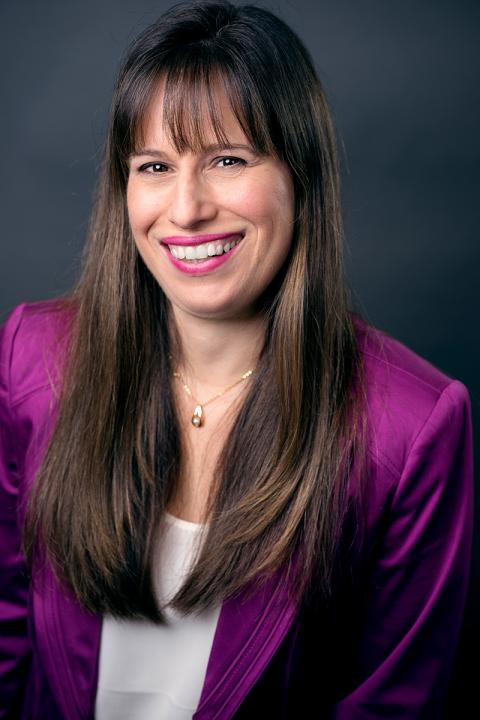Rebecca Wolitz Sirbu ’94
This year, the Alumnae/i Association, AAVC, turns 150. Throughout 2021, the College has celebrated this anniversary by highlighting a few of Vassar’s most notable alums in architecture, arts, business, education, entertainment, health care, humanitarian efforts, law, social justice, and technology.

Occupation:
Rabbi and Executive Vice President at the Jewish Funders Network
Calling:
Using Jewish wisdom and tradition to help people manage the challenges in their lives
Accomplishments:
Rabbi Rebecca Sirbu is a veteran nonprofit executive who brings a creative mindset and an entrepreneurial approach to tackling social problems from the local to the global. Since becoming ordained in 2000, Sirbu has delved into a wide range of issues not limited to: fighting gender bias in the job market; reconciling religion and science; and creating non-traditional spaces for spiritual connection as both synagogue and church attendance declines.
In 2008, Sirbu became the first director of Rabbis Without Borders—an arm of the National Jewish Center for Learning and Leadership—and created a fellowship program that blossomed into an ideas incubator for rabbis across the country. For 10 years, Sirbu guided the center’s fellows as they set up new service organizations, think tanks, and spiritual communities. “I was able to work with rabbis across the denominational spectrum, helping them have this growth mindset and to think of new ideas for how they wanted to teach Jewish wisdom and make it more accessible and meaningful to people that they were working with,” she recalls. “It was really a phenomenal experience.”
At the same time, Sirbu founded two other organizations that are still going strong: RabbiCareers.com and the Gender Equity in Hiring Project, which “happened as an outgrowth of the Me Too movement,” she explains. “Because I’d been working in this area of hiring and placement, I had heard some really horrible stories of women’s experiences going through the hiring process—both within the synagogue world and other Jewish communal organizations; women being asked questions that are technically illegal but somehow people felt okay asking: ‘How can you be a mother and be a rabbi?’ ‘How many children are you planning on having?’…and even worse.” Sirbu and her co-founder created a training program to educate Jewish organizations on how to remove gender bias from every aspect of hiring—from interview questions to salary negotiations. “Gender-fluid people also have a very hard time being hired in the Jewish community and certainly face bias, so our anti-bias training includes that now as well,” she notes.
Looking Back:
As a Texan, Sirbu had some things to get used to in Poughkeepsie—particularly during cold winter nights in Lathrop. “I remember the very first time I heard that clanging sound in the middle of the night,” she says, “and I was like, ‘What the hell is that? Is the building about to come down?’ Because there’s no such thing as radiator heat in Texas!” Sirbu more fondly recalls the Sabbath dinners that took place in the Lathrop basement. “When I got to Vassar, I wasn’t so involved in Jewish issues,” she remembers, “but the warmth of the Vassar Jewish community brought me in.”
Sirbu majored in history, minored in religion, and wrote her undergraduate thesis on the history of Jewish feminism. Upon graduating, she entered the Jewish Theological Seminary in New York City—not exactly a hotbed of feminist thinking. “Women had only been ordained for about 10 years when I was at rabbinical school,” she says. “There were professors who made it clear that they didn’t think women should be ordained; they would say so in class.” Sirbu relates that the experience couldn’t have been more different than her college years. “As a woman, I felt very supported in everything I did and all my intellectual pursuits at Vassar,” she says. When asked if she ever thought of dropping out of rabbinical school, Sirbu lets out a Texas-sized laugh. “Oh, yeah!” she exclaims. “Every year I thought of leaving, but I’m a very goal-oriented person and I wanted to be a rabbi.” Yet Sirbu knew that once ordained, her career path would be different from that of a typical rabbi. “I had a broader vision for my rabbinate than what we were being presented at school—which I also would attribute to Vassar,” she says. “Vassar is a broad-minded type of place.”
Looking Forward:
In the summer of 2021, Sirbu left a job as Chief Engagement Officer at Hadassah, the largest Jewish women’s organization in the United States, to become Executive Vice President at the Jewish Funders Network. “As is the case with so many people, the pandemic helped me reflect on where I was in my career and what I really wanted to be doing and accomplishing,” she explains. Sirbu believes JFN’s global reach will allow her to help a lot more people both within and outside of the Jewish community. “I feel very honored to work with philanthropists who have the ability to make a big impact in the world and to be able to make connections between them and to introduce them to issues where they can truly make a difference,” she says. Sirbu is planning to build a JFN philanthropy network that will address issues of particular importance to women. Which ones would she like to tackle specifically? “All of them!” she declares with a boisterous laugh. Her list includes everything from pay equity to domestic violence. “There was a study that just came out showing that less than two percent of philanthropy goes to women’s issues,” she says. She repeats that figure loudly and slowly: “two…percent,” amplifying the absurdity and disgrace of it. “One of my goals would definitely be to help build the women’s philanthropic field and giving through a gendered lens,” she says, “so that giving in this area can really have an impact.”